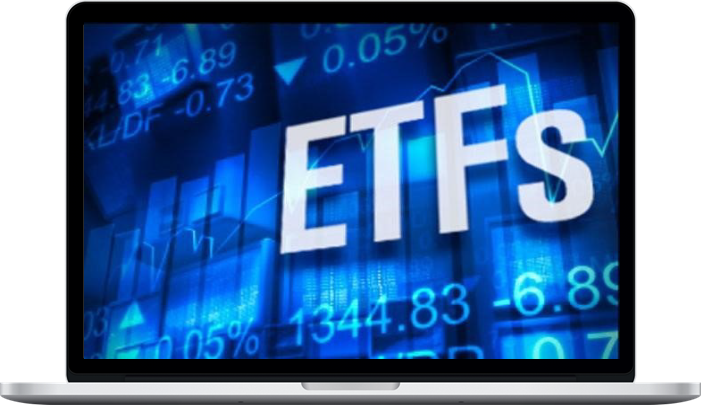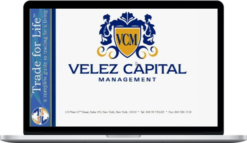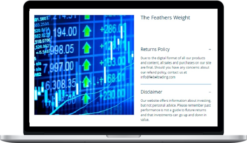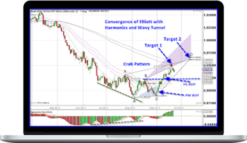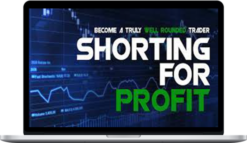Mastertrader – How To Invest And Trade In ETFs
$477.00 $47.00
»Instant Delivery
Description
Mastertrader – How To Invest And Trade In ETFs
An ETF (Exchange Traded Fund) is a diversified collection of assets (like a mutual fund) which trades on an exchange, like a stock.
How To Invest And Trade In ETFs will teach you how to Swing Trade ETFs for regular Income and Core Trade them to generate Wealth with longer holding periods to profit from bullish or bearish macro trends.
Imagine this. ETFs allow you to trade an entire Index, Sector, Country, Currency, or Commodity with one click versus searching for a “perfect stock!”
You will learn Master Trader’s exact “techno-fundamental” approach – which combines Market Internals, Inter-market Analysis, and Technical Analysis.
Learn to trade and invest in the ETF with the most compelling opportunity without having to be dragged down by a broader index carrying the “lagging sectors/stocks.”
Most investors education and/or the time to be stock pickers in their home markets.
So, it makes perfect sense to just trade the most compelling ETFs instead.
Using the Master Trader approach, ETFs make that easy and cheap to do, and there isn’t the large gap risk with trading stocks.
What You’ll Learn In How To Invest And Trade In ETFs?
Learn ETFs Defined and Benefits Over Trading Stocks
- After fully covering what Exchange Traded Funds (ETFs) are and their benefits over trading stocks, we will introduce you to the Master Trader Approach to Trading and Investing.
- Then we will provide you with a great focused list of diverse ETFs for your starting universe, and show you how — and why — different ETFs move.
- We will then explain what Contango is in Commodity ETFs and how to use that to your benefit.
- Finally, we will discuss leveraged ETFs and the positive or negative effect on returns arising from the fund manager’s required daily rebalancing.
- We move on to the Master Trader Techno-Fundamental Approach and starting put together our ETF plan.
Learn the Master Trader Approach to Investing and Trading ETFs
- We will provide a detailed explanation to the Master Trader Approach to Trading and Investing in ETFs, including our 3-Legged Stool approach to using Market
- Internals, Inter-market Analysis, and Technical Analysis. It will explain how we scan our ETF Universe on Multiple Time Frames (MTF) using the Master Trader Trend Matrix — and the time periods used for swing and core trading for income and wealth.
- We will cover how to use trader Sentiment, market Breadth, and Volatility to time with precision entries in trading ETFs.
- Finally, we will show you how we use Inter-Market Analysis to find opportunity in ETFs, and discuss the principles of Dow Theory and Business Cycles.
Learn Swing and Positions Trading ETFs Using Master Trader Strategies
- With the solid foundation obtained from the first two modules, this module will explain why we swing and core trade ETFs — and show you how to trade in up trends and downtrends select patterns for swing and core trading.
- Through real examples from our ETF Investment Trader letter, we will show you exactly how to swing trade ETFs (where our main trading bias will come from the Daily time frame, with the Weekly confirming) and core trade ETFs.
- Our main trading bias will come from the Weekly time frame, and we will show you how to use two other time frames to increase the odds.
- Trade management will be covered in the time frames being traded.
Learn Option Strategies for Increasing Yield on ETFs
- Whether you are a swing or position trader of ETFs, selling options using the Master Trader Method (MTM) will increase your Probability of Profit.
- After explaining what call and put options are, we will cover two strategies for achieving an additional yield on swing and core trades:
- Legging Into Covered Calls when momentum stalls to reduce the Cost Basis; and Selling Puts/Spreads with a bullish ETF Setup as an alternative or new trade.
- Knowledgeable investors and sellers sell options to the novice option buyers with the expectation of keeping 100% of the premium received as a profit.
- We will show you through real examples from our ETF Investment Trader letter how to “get paid” during expected retracements or consolidations when the reasons for staying in the trade remain valid.
More courses from the same author: Mastertrader
Delivery Policy
When will I receive my course?
You will receive a link to download your course immediately or within 1 to 21 days. It depends on the product you buy, so please read the short description of the product carefully before making a purchase.
How is my course delivered?
We share courses through Google Drive, so once your order is complete, you'll receive an invitation to view the course in your email.
To avoid any delay in delivery, please provide a Google mail and enter your email address correctly in the Checkout Page.
In case you submit a wrong email address, please contact us to resend the course to the correct email.
How do I check status of my order?
Please log in to TradingAZ account then go to Order Page. You will find all your orders includes number, date, status and total price.
If the status is Processing: Your course is being uploaded. Please be patient and wait for us to complete your order. If your order has multiple courses and one of them has not been updated with the download link, the status of the order is also Processing.
If the status is Completed: Your course is ready for immediate download. Click "VIEW" to view details and download the course.
Where can I find my course?
Once your order is complete, a link to download the course will automatically be sent to your email.
You can also get the download link by logging into your TradingAZ account then going to Downloads Page.


